Find Help
More Items From Ergsy search
-
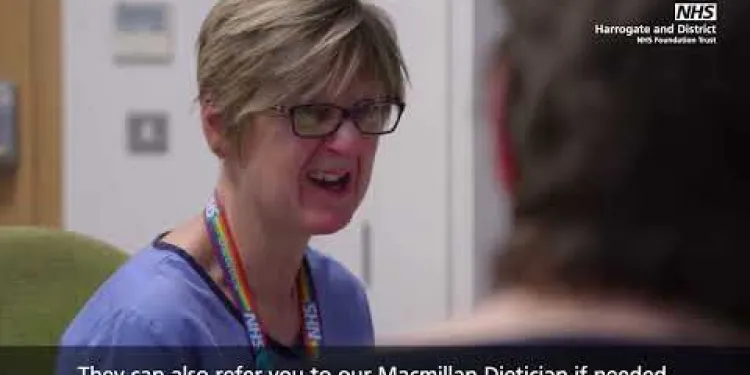
Information for all cancer patients receiving Chemotherapy or Targeted Therapy at HDFT.
Relevance: 100%
-

Can prostate cancer be treated with targeted therapy?
Relevance: 95%
-
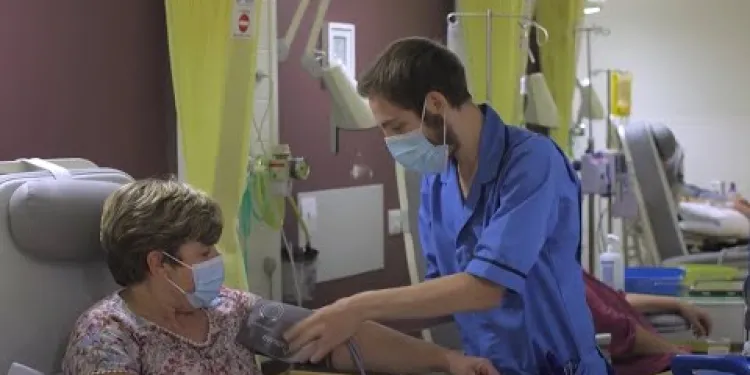
Chemotherapy - the patient journey
Relevance: 77%
-
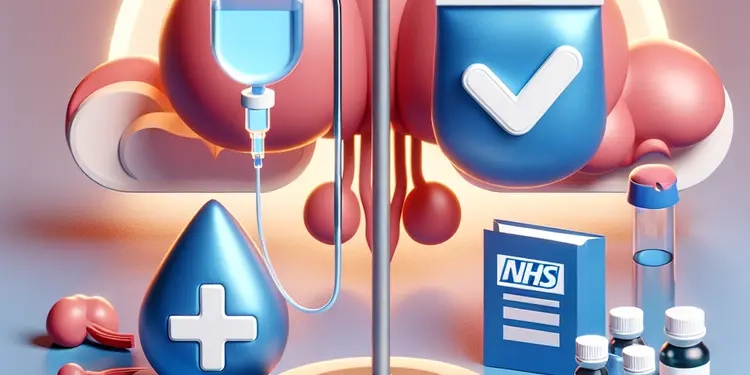
When is chemotherapy used for prostate cancer?
Relevance: 76%
-
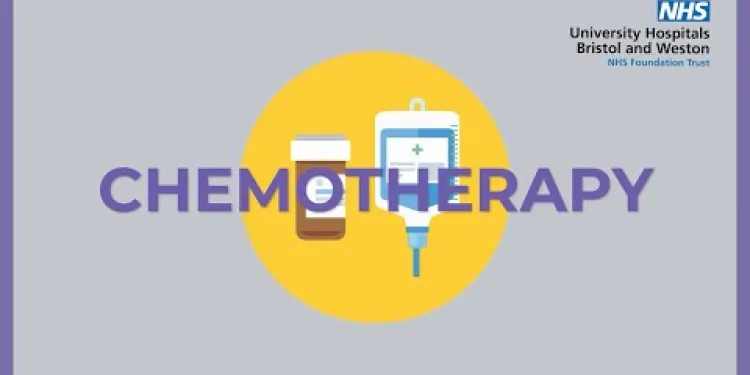
Chemotherapy
Relevance: 69%
-

Is Abiraterone a chemotherapy drug?
Relevance: 67%
-

What is radiation therapy?
Relevance: 60%
-
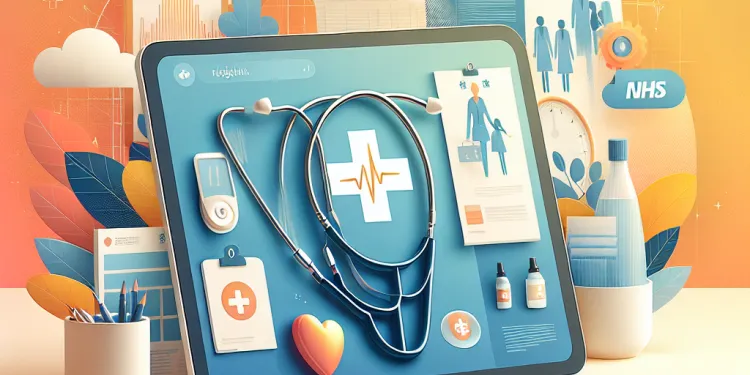
Breakthrough Cancer Treatment Shows Promise for NHS Patients
Relevance: 60%
-

Breakthrough in Cancer Treatment Offers Hope for Prostate Cancer Patients
Relevance: 60%
-
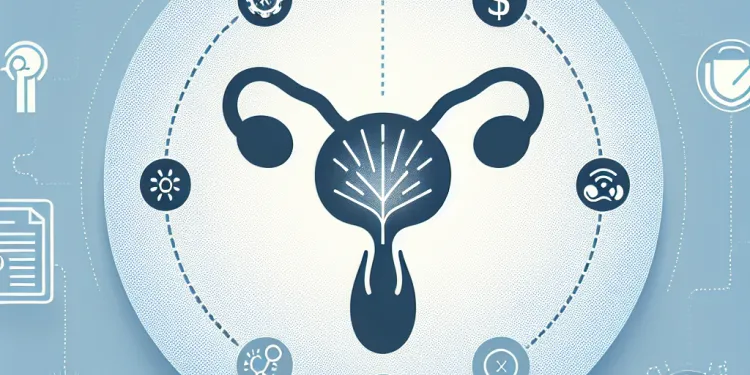
Hormone Therapy for prostate cancer
Relevance: 59%
-
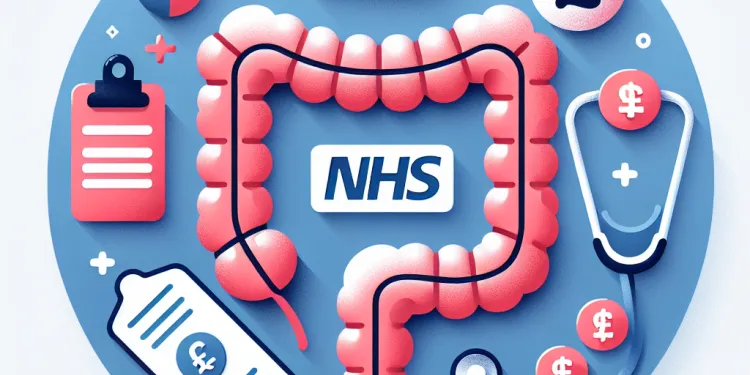
What treatment options are available for bowel cancer?
Relevance: 59%
-

How is advanced prostate cancer treated?
Relevance: 59%
-
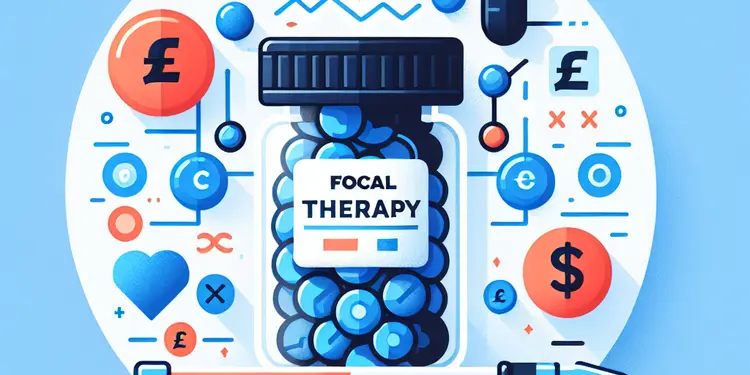
Is focal therapy an option for prostate cancer?
Relevance: 58%
-

What types of treatments are available for testicular cancer?
Relevance: 58%
-

How is prostate cancer treated?
Relevance: 56%
-
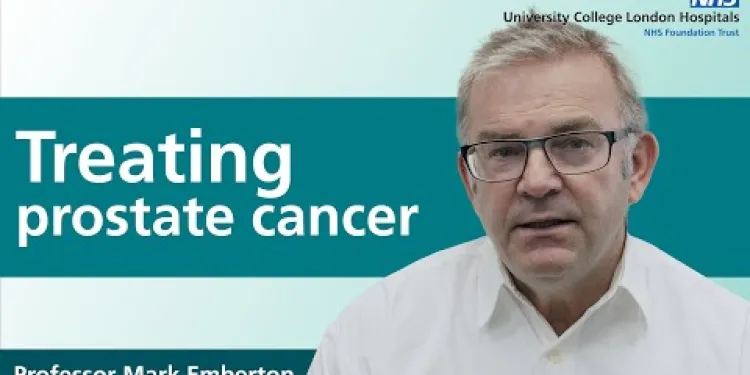
Treating prostate cancer
Relevance: 55%
-
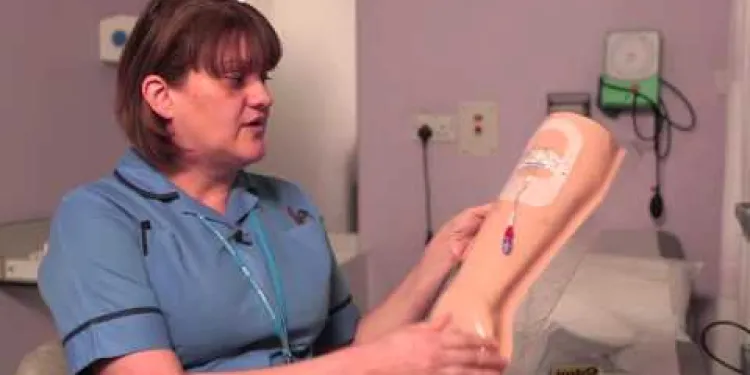
Chemotherapy - The Queen's Centre
Relevance: 54%
-
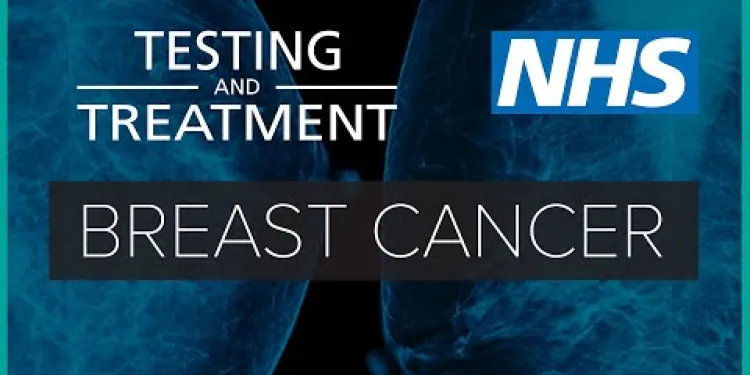
Breast cancer: testing and treatment | NHS
Relevance: 54%
-
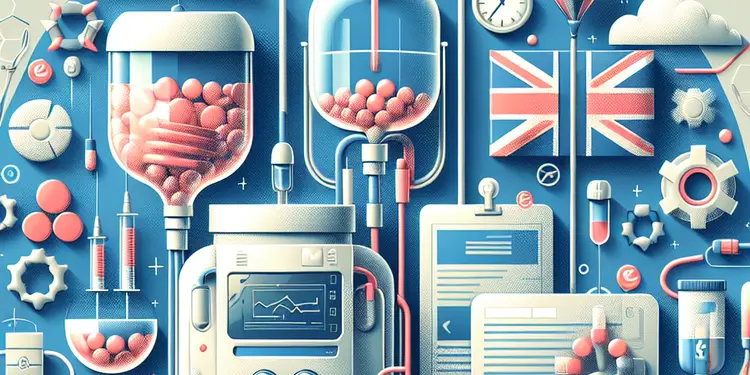
Is Paillon treatment a form of chemotherapy?
Relevance: 53%
-

What is colorectal cancer?
Relevance: 53%
-
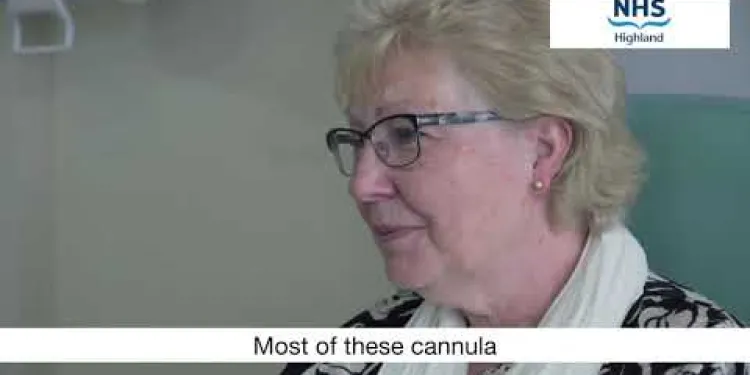
Introduction to Chemotherapy, NHS Highland
Relevance: 53%
-

How does hormone therapy help in treating prostate cancer?
Relevance: 50%
-
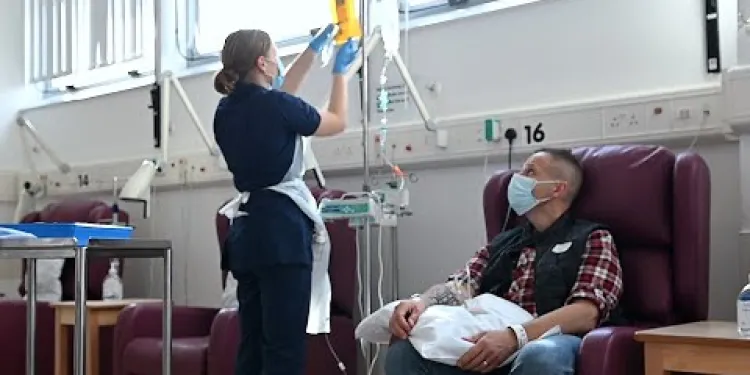
Having chemotherapy and other treatments in the Day Treatment Unit
Relevance: 48%
-

What is Paillon treatment for cancer?
Relevance: 48%
-
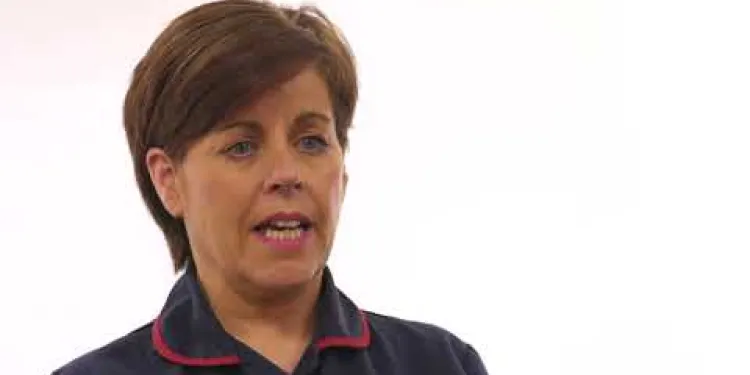
Ovarian Cancer
Relevance: 48%
-
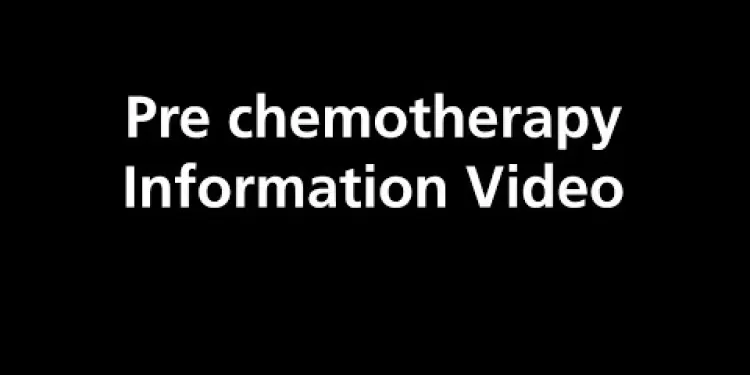
Pre chemotherapy Information Video
Relevance: 47%
-
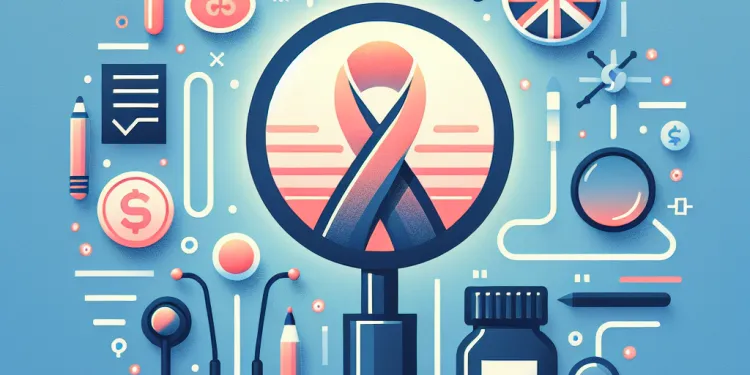
Is testicular cancer treatable?
Relevance: 47%
-
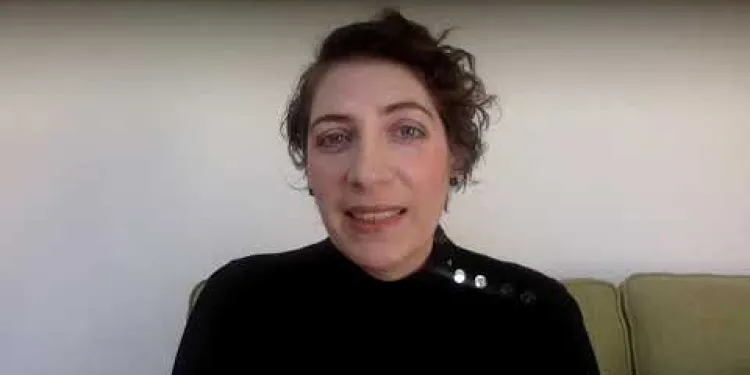
World Pancreatic Cancer Day - No Time to Wait
Relevance: 46%
-
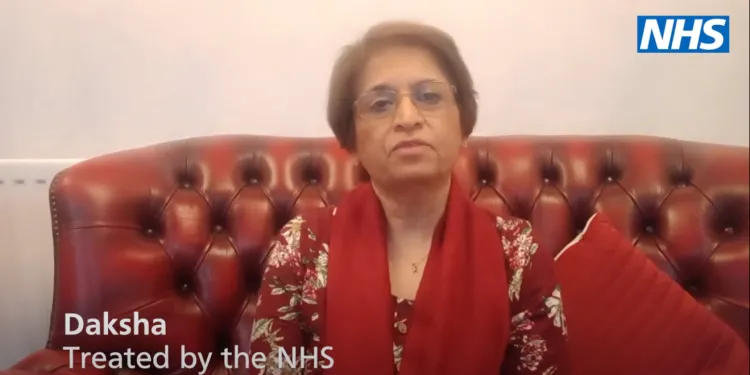
What is Cancer?
Relevance: 46%
-
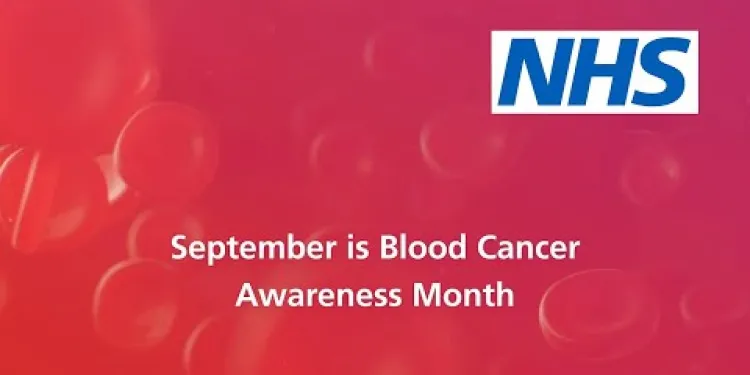
4 facts about blood cancer that you should know | NHS
Relevance: 44%
-
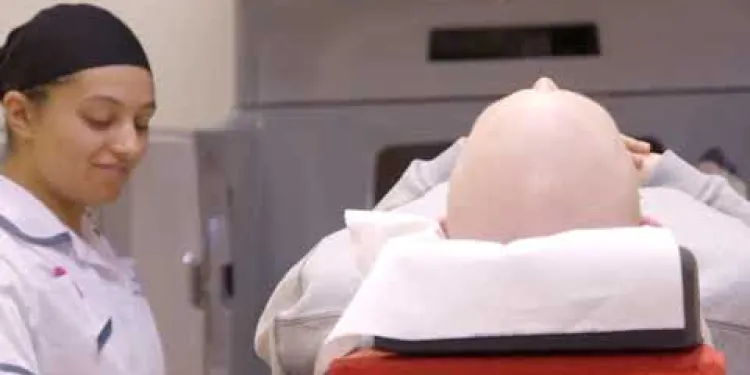
What is Radiotherapy, and its use in treatment for cancers?
Relevance: 44%
-
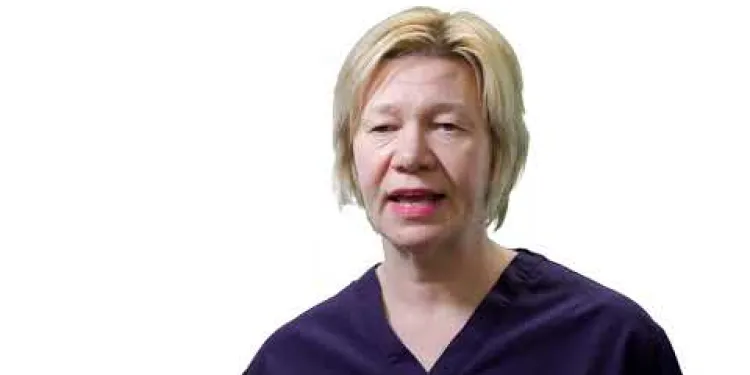
Head and Neck Cancer Diagnosis
Relevance: 44%
-

Can bowel cancer spread to other parts of the body?
Relevance: 44%
-
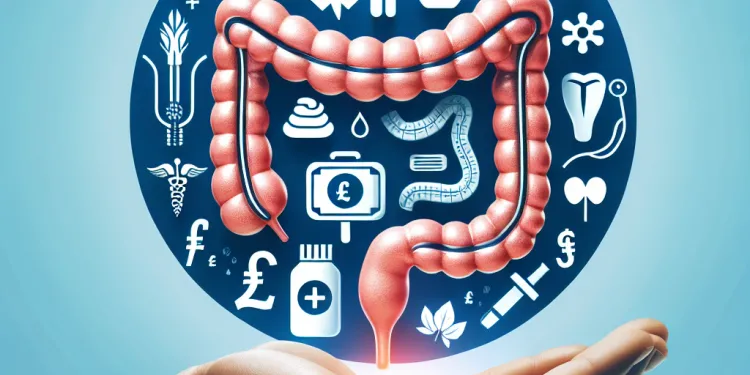
What are the side effects of bowel cancer treatment?
Relevance: 44%
-
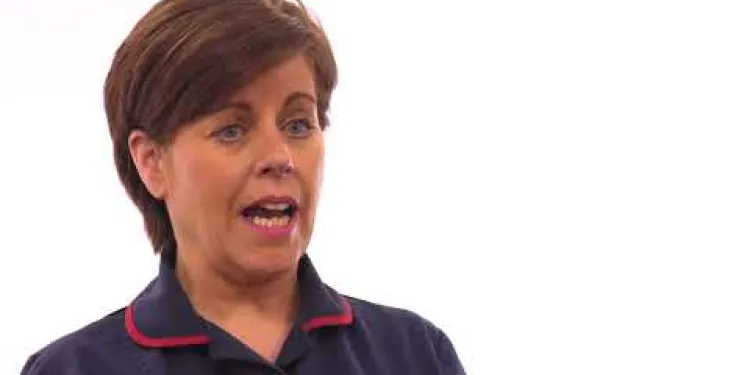
Endometrial Cancer
Relevance: 44%
-
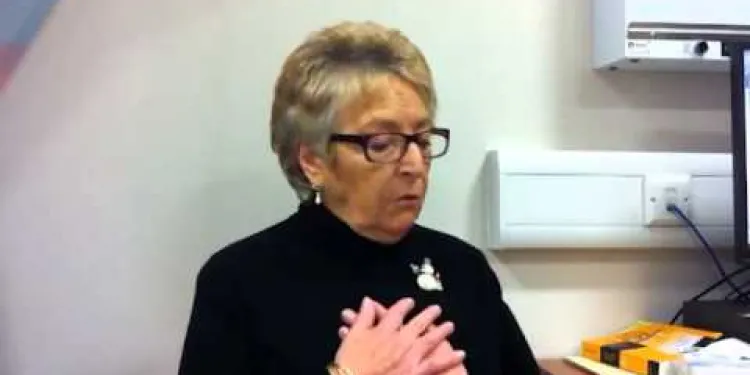
Neuroendocrine tumour patient video
Relevance: 43%
-
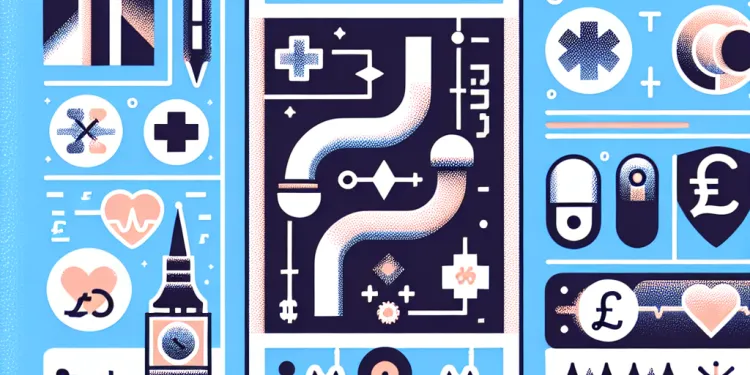
What is Pancreatic Cancer?
Relevance: 43%
-
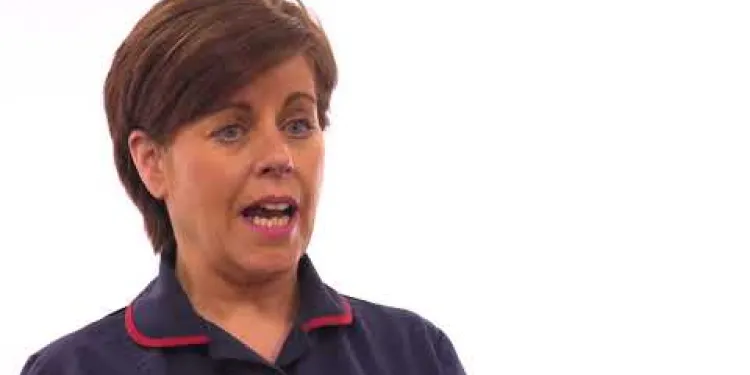
Endometrial Cancer
Relevance: 43%
-

How can AI improve patient outcomes in lung cancer?
Relevance: 43%
-

Are there online support services for prostate cancer patients on the NHS?
Relevance: 42%
Information for All Cancer Patients Receiving Chemotherapy or Targeted Therapy at HDFT
Introduction
At Harrogate and District NHS Foundation Trust (HDFT), we are committed to providing the best care and support for cancer patients undergoing chemotherapy or targeted therapy treatments. This guide provides vital information that will help you understand your treatment process and what to expect during your journey.
What to Expect During Treatment
Before starting your treatment, you will have a consultation with your oncology team, where detailed information about your specific chemotherapy or targeted therapy regimen will be shared. You may experience side effects such as fatigue, nausea, or hair loss. It’s crucial to report any side effects to your healthcare provider to manage them effectively.
Support Services
HDFT offers a range of support services including nutritional counseling, psychological support, and complementary therapies to help you manage your treatment and maintain your well-being. Our dedicated cancer support nurses are available to answer your questions and provide emotional support.
Travel and Transportation
For patients who require assistance with travel, HDFT provides transportation services to and from the hospital. We also offer information on local charity services that provide additional support for travelling to appointments.
Contact Information
If you have any concerns or questions about your treatment, please contact the Oncology Department at HDFT. For urgent queries outside of regular hours, we have a dedicated helpline available.
Information for All Cancer Patients Receiving Treatment at HDFT
Introduction
At Harrogate and District NHS Foundation Trust (HDFT), we want to give cancer patients the best care. This guide will help you understand your treatment and what to expect.
What to Expect During Treatment
Before your treatment starts, you will talk to your cancer doctor. They will tell you all about your treatment. You might feel tired, sick, or lose your hair. Tell your doctor if you feel unwell so they can help you.
Support Services
HDFT offers many support services like help with eating well, talking to someone if you're feeling upset, and other therapies. Our cancer nurses are there to answer questions and support you.
Travel and Transportation
If you need help getting to the hospital, HDFT can help with travel. We can also tell you about local charities that offer travel help to get to your appointments.
Contact Information
If you have questions or worries about your treatment, please call the Oncology Department at HDFT. We have a special phone line for urgent questions after hours.
Frequently Asked Questions
What should I do if I feel unwell during my chemotherapy or targeted therapy treatment?
If you feel unwell, it's important to contact the 24-hour Chemotherapy Helpline provided by HDFT. They are equipped to offer advice and support tailored to your specific situation.
Can I continue to work while receiving chemotherapy or targeted therapy?
Many people continue to work during treatment, but it depends on how you feel and your type of work. It's a good idea to discuss this with your healthcare team who can provide personalised advice.
Are there any dietary restrictions I need to follow while undergoing treatment?
There are no specific dietary restrictions unless advised by your doctor. However, it's important to maintain a well-balanced diet and stay hydrated. If you experience nausea or other side effects, your healthcare team can offer dietary suggestions to help manage these symptoms.
What side effects can I expect from chemotherapy or targeted therapy?
Side effects vary depending on the specific treatment. Common side effects include fatigue, nausea, hair loss, and an increased risk of infections. Your healthcare team will provide you with information on managing these side effects.
Can I drive myself to and from treatment sessions?
If you feel well enough, you may drive yourself. However, some treatments can cause fatigue or other side effects that may impair your ability to drive safely. It's best to arrange for someone to drive you, especially for your first few sessions until you know how the treatment affects you.
How long does a chemotherapy session usually last?
The duration of a chemotherapy session can vary significantly based on the type of drugs being administered. It can take anywhere from 30 minutes to several hours. Your healthcare team will provide specific details about your treatment schedule.
Is it safe to be around family and friends during treatment?
Yes, it is generally safe to be around family and friends. However, you should avoid close contact with people who are sick or have infections, as your immune system may be weakened by the treatment.
What should I do if I miss a treatment session?
Contact your healthcare team as soon as possible. They will advise you on the best course of action and may reschedule your missed session.
Can I take over-the-counter medications during my treatment?
Always check with your healthcare team before taking any over-the-counter medications, as they can interact with your treatment.
Are there any special precautions I need to take with my dental health?
Good dental hygiene is important. Inform your dentist about your treatment, and consult with your healthcare team before undergoing any dental procedures.
Will I lose my hair during treatment?
Hair loss is a common side effect of some chemotherapy treatments but not all. Targeted therapies may also have varying effects on hair. Your healthcare team can provide more details based on your specific treatment regimen.
Can I exercise while receiving treatment?
Light to moderate exercise is often encouraged as it can help manage fatigue and improve mood. However, exercise plans should be discussed with your healthcare team to ensure safety.
What should I do if I experience severe side effects?
Immediately contact the 24-hour Chemotherapy Helpline provided by HDFT if you experience severe side effects. They will give you advice and may direct you to seek urgent medical attention if necessary.
Is it safe to travel during my treatment period?
Travel plans should be discussed with your healthcare team. They will consider your treatment schedule and any potential health risks before giving you advice.
How can I manage nausea and vomiting caused by chemotherapy?
Your healthcare team can prescribe anti-sickness medications. Additionally, eating small, frequent meals and avoiding strong smelling foods may help. Always follow the specific recommendations provided by your healthcare team.
What can I do if I feel sick during my cancer treatment?
If you feel bad or sick while getting cancer treatment, tell your doctor or nurse. They can help you feel better.
Here are some things you can do:
- Rest when you feel tired.
- Drink lots of water to stay hydrated.
- Eat small meals if you can.
- Have someone with you to help.
Use tools like a notebook to write down how you feel. Share this with your doctor. They can give you more tips to feel better.
If you feel sick, you should call the Chemotherapy Helpline. You can call them anytime, day or night. They are there to help you and give advice that is just right for your needs.
If you have trouble reading, you can try using a ruler to follow the lines or read out loud. You can also ask someone you trust to read with you or explain anything you don't understand.
Can I still work while getting treatment like chemotherapy?
Chemotherapy is a strong medicine to help fight cancer. Some people might feel too tired or sick to work while getting this treatment. But others might feel okay and can still do their jobs. It is different for everyone.
If you are having trouble working while getting treatment, talk to your doctor or nurse. They can give you advice and help you find ways to make things easier.
Here are some things that might help you work while getting treatment:
- Take breaks often to rest.
- Try to work from home if you can.
- Tell your boss or teacher about your treatment, so they understand.
Remember, it is important to take care of yourself and not do too much.
Some people keep working while they get their treatment. It depends on how you feel and what kind of job you have. It's smart to talk about this with your doctor or nurse. They can help and give you good advice just for you.
Do I need to follow any special food rules during my treatment?
While you are getting better, you might need to follow some special food rules. This means there are certain foods you should eat or avoid.
It's important to ask your doctor or nurse about what you can eat. They will tell you if there are foods that can help you or foods to stay away from.
You can use a food chart or a meal planner to remember what to eat every day. It might also help to write down what you eat in a food diary.
There are no special rules about what you can eat unless your doctor tells you something different. But it's good to eat healthy foods and drink plenty of water. If you feel sick or have other problems, your doctor or nurse can give you tips on what to eat to feel better.
What happens to my body with cancer treatment?
Cancer treatment can make you feel different. Here are some things that might happen:
- You might feel very tired.
- Your hair could fall out.
- You might not feel like eating.
- You could feel sick or throw up.
If you are worried, talk to your doctor or nurse. They can help you. Reading together with someone can also help you understand better.
When you get treatment, it can sometimes make you feel not so good. This is called side effects.
Different treatments have different side effects. Some common ones are:
- Feeling very tired.
- Feeling sick in your tummy.
- Losing your hair.
- Getting sick more easily.
The doctors and nurses will tell you how to feel better if this happens. You can also write down how you feel every day. This can help you remember to tell the doctor.
Sometimes, using pictures or asking a friend to help you read can make things easier.
Can I drive myself to and from treatment sessions?
Are you wondering if you can drive to your treatment and back home?
Here is what you need to think about:
- Ask your doctor if it is okay for you to drive.
- If you feel tired or dizzy, it might be better if someone else drives you.
- Make sure you feel safe and comfortable before driving.
You can also use these tools to help:
- Maps or GPS apps to find your way.
- A calendar to keep track of your appointments.
Always ask for help if you're not sure.
If you feel okay, you can drive your car. But some treatments might make you tired or feel different. This can make driving hard. It’s a good idea to ask someone to drive you, especially the first few times you go. This way, you can see how the treatment makes you feel.
How long does a chemotherapy session usually last?
Chemotherapy is a treatment for cancer. It can help to stop or slow the spread of cancer cells.
A chemotherapy session usually lasts between 30 minutes to several hours. The time can be different for each person.
To make it easier, you can:
- Ask your doctor about the time your treatment will take.
- Bring a book, music, or a movie to help pass the time.
- Bring a friend or family member for support. They can keep you company.
Chemotherapy sessions can take different amounts of time. Sometimes, it takes 30 minutes. Other times, it can take a few hours. Your doctors and nurses will tell you exactly how long your treatment will be.
If you find reading hard, you can use tools like audiobooks and apps that read text out loud to help you. It’s okay to ask someone to explain things too.
Can I be with my family and friends during treatment?
You might want to know if it is okay to be with people you care about while you are getting better.
Here are some simple things to help:
- Ask your doctor if it is safe.
- Wash your hands to stay clean.
- Use tissues if you sneeze or cough.
- Tell your family to stay home if they feel sick.
These tips can help everyone stay healthy.
Yes, it is usually safe to be with your family and friends. But stay away from people who are sick, as your body might not fight germs well right now.
What to do if you miss a treatment session
If you miss a treatment, tell someone who helps with your care. They can help you decide what to do next.
You can:
- Call the doctor's office
- Talk to a nurse or helper
- Ask a friend or family member for help
Use a calendar or app to remind you of treatment days. Ask someone to remind you too.
Call your doctor or nurse right away. They can tell you what to do next. They might help you pick a new time to go back.
Can I use store-bought medicine while I am getting treated?
Ask your doctor before using any medicine from the store. They can tell you what is safe.
Use tools like pictures or diagrams. They can help you understand better.
Before you take any medicine you buy from a store, ask your doctor or nurse first. Some medicines can mix badly with the ones you are already taking.
What should I do to take care of my teeth?
Taking care of your teeth is important. Tell your dentist about any medical treatment you are getting. Talk to your doctor before you have any dental work done.
Will my hair fall out during treatment?
Some medicines for cancer can make your hair fall out. This does not happen with all treatments. Some special medicines might affect your hair in different ways. You can ask your doctor or nurse what might happen with your treatment.
Can I do exercise while getting treatment?
It is good to do light exercise, like walking, because it can help you feel less tired and make you happier. But, it is important to talk to your doctor or nurse before starting to exercise. They can help make a safe plan for you.
What to do if you feel very bad after taking medicine?
If you feel very sick or have bad feelings after taking your medicine, tell an adult or a doctor right away. They can help you.
Here is what you can do:
- Tell someone you trust, like a parent, teacher, or doctor.
- If you can, call 911 or go to the hospital if it is an emergency.
Remember, it's always okay to ask for help!
If you feel really sick after your chemotherapy, call the Chemotherapy Helpline right away. They are open all the time, every day. They will help you and tell you if you need to see a doctor fast.
Can I Travel While Getting Treatment?
If you are having treatment, ask your doctor if it is safe to travel.
Your doctor can tell you the best time to travel and how to stay safe.
Here are some tips that might help:
- Plan short trips to rest more.
- Take your medicine with you.
- Have a friend or family member go with you.
- Make sure you have a way to contact your doctor.
Talk to your doctor before making travel plans. They will look at your treatment schedule and any health risks. Then, they can give you good advice.
How can I stop feeling sick and throwing up from cancer medicine?
Cancer medicine can make you feel sick in your tummy and make you throw up. Here are some tips to help you feel better:
- Tell your doctor. They can give you medicine to help you feel better.
- Eat small meals. Eating just a little bit at a time can help.
- Drink slowly. Sipping water and other drinks can be good.
- Avoid strong smells. Some smells can make you feel worse. Try to stay away from them.
- Rest. Get plenty of sleep and try to relax.
- Use a fan or open a window if you get too hot.
Ask someone to help you if it is hard for you to do these things alone. You can also try making a calm and happy space where you can rest.
Your doctor can give you medicine to stop feeling sick. You can also eat small meals often and stay away from foods with strong smells. Always listen to what your doctor says and follow their advice.
Useful Links
Have you found an error, or do you have a link or some information you would like to share? Please let us know using the form below.
-->
This website offers general information and is not a substitute for professional advice.
Always seek guidance from qualified professionals.
If you have any medical concerns or need urgent help, contact a healthcare professional or emergency services immediately.
Some of this content was generated with AI assistance. We’ve done our best to keep it accurate, helpful, and human-friendly.
- Ergsy carfully checks the information in the videos we provide here.
- Videos shown by Youtube after a video has completed, have NOT been reviewed by ERGSY.
- To view, click the arrow in centre of video.
- Most of the videos you find here will have subtitles and/or closed captions available.
- You may need to turn these on, and choose your preferred language.
- Go to the video you'd like to watch.
- If closed captions (CC) are available, settings will be visible on the bottom right of the video player.
- To turn on Captions, click settings .
- To turn off Captions, click settings again.
More Items From Ergsy search
-

Information for all cancer patients receiving Chemotherapy or Targeted Therapy at HDFT.
Relevance: 100%
-

Can prostate cancer be treated with targeted therapy?
Relevance: 95%
-

Chemotherapy - the patient journey
Relevance: 77%
-

When is chemotherapy used for prostate cancer?
Relevance: 76%
-

Chemotherapy
Relevance: 69%
-

Is Abiraterone a chemotherapy drug?
Relevance: 67%
-

What is radiation therapy?
Relevance: 60%
-

Breakthrough Cancer Treatment Shows Promise for NHS Patients
Relevance: 60%
-

Breakthrough in Cancer Treatment Offers Hope for Prostate Cancer Patients
Relevance: 60%
-

Hormone Therapy for prostate cancer
Relevance: 59%
-

What treatment options are available for bowel cancer?
Relevance: 59%
-

How is advanced prostate cancer treated?
Relevance: 59%
-

Is focal therapy an option for prostate cancer?
Relevance: 58%
-

What types of treatments are available for testicular cancer?
Relevance: 58%
-

How is prostate cancer treated?
Relevance: 56%
-

Treating prostate cancer
Relevance: 55%
-

Chemotherapy - The Queen's Centre
Relevance: 54%
-

Breast cancer: testing and treatment | NHS
Relevance: 54%
-

Is Paillon treatment a form of chemotherapy?
Relevance: 53%
-

What is colorectal cancer?
Relevance: 53%
-

Introduction to Chemotherapy, NHS Highland
Relevance: 53%
-

How does hormone therapy help in treating prostate cancer?
Relevance: 50%
-

Having chemotherapy and other treatments in the Day Treatment Unit
Relevance: 48%
-

What is Paillon treatment for cancer?
Relevance: 48%
-

Ovarian Cancer
Relevance: 48%
-

Pre chemotherapy Information Video
Relevance: 47%
-

Is testicular cancer treatable?
Relevance: 47%
-

World Pancreatic Cancer Day - No Time to Wait
Relevance: 46%
-

What is Cancer?
Relevance: 46%
-

4 facts about blood cancer that you should know | NHS
Relevance: 44%
-

What is Radiotherapy, and its use in treatment for cancers?
Relevance: 44%
-

Head and Neck Cancer Diagnosis
Relevance: 44%
-

Can bowel cancer spread to other parts of the body?
Relevance: 44%
-

What are the side effects of bowel cancer treatment?
Relevance: 44%
-

Endometrial Cancer
Relevance: 44%
-

Neuroendocrine tumour patient video
Relevance: 43%
-

What is Pancreatic Cancer?
Relevance: 43%
-

Endometrial Cancer
Relevance: 43%
-

How can AI improve patient outcomes in lung cancer?
Relevance: 43%
-

Are there online support services for prostate cancer patients on the NHS?
Relevance: 42%


